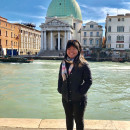Language and Pasta Past Review
By A student (Sarah Lawrence College) - abroad from 02/11/2019 to 05/31/2019 with
Middlebury Schools Abroad: Middlebury in Florence
It was completely worthwhile! I learned a lot about my resilience and how I handle myself in a different culture.
Review Photos




Personal Information
| How much international exposure did you have prior to this program? | 0-2 weeks |
Review Your Program
|
* Overall educational experience
Academic rigor, intensity, resources, etc. |
The courses were amazing! I wouldn't say that they were overwhelmingly hard. Art history and of course beginner Italian was a little more rigorous than Italian Contemporary society. I really enjoyed learning about where I was while I was living there. There's nothing like seeing the art. Also, I loved all of my teachers! |
|
* Host Country Program Administration
On-site administration of your program |
Everyone was so nice and helpful. When ever I had extra questions about the extra trips, or needed assistance finding routes to my school, they were more than happy. Professor Rosa Cuda, head of the program made herself available to any student who needed assistance or wanted help, and I took her up on it. |
|
* Housing:
How satisfied were you with your living arrangements? |
My host mom, Maria, was so nice! The only weird thing was that when it wasn't my hour to be in the kitchen, such as breakfast and dinner, I could not use the kitchen. I think that was the set up in a lot of homes, but it was a little weird. I even couldn't go in and get a drink of water or use the hot water heater. I'm sure if I asked once or if if I was sick, but it definitely wasn't open to me at all hours like I truly lived there. That's because I chose the option where I get meals 5 times a week. And Maria was a wonderful cook! So, not being able to use the kitchen evened out with wonderful food and Italian conversation at dinner. It was also nice to know that I'm coming home to people who cared about me and wanted to make me feel comfortable, especially after a hard day. So, yea, there's rules and you don't live in the house like your own house. But I highly recommend it over living in an apartment style living. It's just totally different and you get an inside view of another culture. Also, I'm still in contact with my host family. Who knows, maybe I'll see them again when I return. |
| * Food: |
I always say I came to Italy for two things, to learn Italian and to eat a lot of pasta. And I think I achieved those goals. The food in Italy was amazing. They don't do other countries' food well, though. So don't go to Italy and think you'll get good sushi when you're sick of pasta. Sure, maybe in Milan, or some newer restaurants in Florence. But for the most part, the best and always satisfying bet is Italian. You'll be sick of pasta and pizza, but even their bad pizza is America's good pizza. |
|
* Social & Cultural Integration:
How integrated did you feel with the local culture? |
It of course was hard to integrate with the local culture as a foreigner who was a beginner with the language. I did a lot of people watching. Also, I am Chinese, so I certainly didn't blend in as well as my peers who weren't Chinese or a person of colour. But, I did find my favorite cafe and made friends with the worker there who knew my lunch order. That is one of the small joys. When you do start to feel like a local, or at least an ex-pat American living abroad. Also, when you return you'll be even more ready for the culture that after a month or so became like a home or another culture in your toolbox to be able to live in. |
|
* Health Care:
How well were health issues addressed during the program? |
Luckily, I didn't have any major health issues. The school was great about telling us about our insurance and explaining doctors etc. There were no mental health services offered, but I leaned on my professors and Dr. Rosa Cuda to help trouble shoot or just be someone to talk to. They make themselves available and when you're open to talking to them, they are also open to talking to you. |
| * Safety: |
Overall, Florence is a pretty safe city. I would say use the same street sense that you use if you're walking around NYC. It might be a little harder because of the language difference. Don't make your wallet readily open for people. Don't carry one of those phone cases with your credit cards and cash and everything all in one. Because one person had that stolen and she was stuck. Everything was in that small phone case. Keep things seperate. Even when some people felt safe walking home alone at night, I opted to take a taxi. I didn't grow up in a city so I know I can look easier like a target. I didn't take any chances. People will be interested in you because you're a foreigner. It's obvious. Even if you don't wear white sneakers and don't speak a word of English, just like we can tell a non-American often, they can tell a non-Italian. So, people might approach you for money, or one person tried to start a convo with me in the park, and then he asked if I wanted his number to meet up again tomorrow. I said no, and walked away. I don't know what his intentions were, but it's better safe than sorry. So, be open to meeting people, but keep your wits about you. Foreigners are often targeted mainly for money of course. But, overall, even in the center, it was safe at night. There's plenty of people. Sometimes, though they are rowdy other foreigners. |
| If you could do it all over again would you choose the same program? |
Yes
Absolutely! There are things that I would do differently, and I would want to feel more prepared for the language, but |
Finances
|
* Money: How easily were you able to live on a student's budget?
(1 = not very easy/$200+ on food & personal expenses/week, 2.5 = $100/week, 5 = very easily/minimal cost) |
My mom and I went over a budget for me based on my income and some money slc reimbursed that would have gone to education anyway. It's different for everyone. But, mainly if you don't go overboard, there was plenty that you can do on a budget. Also, having meals 5 days a week really helped because there's a dinner you have planned into your living expenses. Just like living on campus. Sure, more money was spent to see museums and buy things. But, Middlebury trips are mostly part of your tuition or for a very small fee. |
| Not including program expenses, about how much money did you spend on food and other expenses each week? | Less than 20 euros most weeks, some weeks less than 50 euros. Depending on if I went on any day trips with the school or outside of the school. Then, you spend more. |
| Do you have any general money-saving tips for future study abroad participants? | I lived right next to the best gelato place. So it was really hard not to get gelato every day. But, you have to decide what you want. I chose to spend money on a couple larger items instead of a bunch of smaller items. Some people bought a lot of food. I kept a budget and while I didn't beat myself over the head with it, I kept an eye on what I was spending. Some weeks I went over, and some I was under, so it evens out. I know we all love fast fashion, but I think buying a couple meaningful things is better than going to OVS, the Forever 21 like store. Walk more places than taking the bus or taxis. |
Language
| * Did your program have a foreign language component? | Yes |
|
How much did the program encourage you to use the language?
0 = No encouragement, 5 = frequent encouragement to use the language |
The Middlebury language pledge states that you will only speak the target language while abroad. Of course, with your friends you break it sometimes. But even in the academic classroom, it can be hard. For beginners that pledge was eased into, as we came in not knowing anything. But, this is a big part of Middlebury, which is why I chose the program. I really wanted to learn another language. |
| How would you rate your language skills at the beginning of the program? | None |
| How would you rate your language skills at the end of the program? | Intermediate |
| What was the highest level language course you had completed prior to departure? | None, but I had 5 years of Spanish which really helped. |
| How many hours per day did you use the language? | |
| Do you have any tips/advice on the best ways to practice the language for future study abroad participants? | Just listen for the first days and always continue listening. Even if you see a word you might think that's how it's said, but when you hear a local you really understand the cadence of the language. It no longer is abstract. It's a language. It's how they are telling you about their day just like English. Look and try to read posters. Try to order at small cafes or even say "ciao." If you mess up, the Italians are normally very nice and think it is so sweet that there is a foreigner trying to learn their language since most people don't try. |
Other Program Information
|
* Where did you live?
Select all that apply |
|
|
* Who did you live with?
Select all that apply |
|
|
* Who did you take classes with?
Select all that apply |
|
| About how many local friends did you make that you will likely keep in touch with? |
A Look Back
| * What did you like most about the program? |
|
| * What could be improved? |
|
| * What do you know now that you wish you knew before going on this program? | I wish I knew that Italians are a little bit of a more closed off group than you would imagine. Just like New Yorkers, they aren't always interested in you because you're American. They're used to foreigners. So, it's more up to you to make connections. It's more up to you to go out there, and stick your head out, try the language. It's not like a college campus where people come to you. You're more on your own and it's what you make of it. There's not events every five seconds like on a college campus. So, learn to be happily alone with yourself and explore a city, meet new people, and learn a new language. |
Reasons For Studying Abroad
| To help future students find programs attended by like-minded individuals, please choose the profile that most closely represents you. |
The Academic or LinguistYou went abroad with specific academic goals in mind; the program credentials and rigor of your coursework abroad were very important to you. You had a great time abroad, but never lost sight of your studies and (if applicable) were diligent with your foreign language study. Good for you! |
Individual Course Reviews
| Course Name/Rating: |
Renaissance Art History |
| Course Department: | |
| Instructor: | Siliva Malaguzzi |
| Instruction Language: | English |
| Comments: | This class was amazing! It totally made use of the location. I tell my friends that there probably was only 5 pieces of art in Florence that we did not see. We went to every museum and church in Florence and even Sienna. It's so cool to be able to see the artwork in real life. It helps break up the lectures and slides. Silvia was always knowledgeable and ready to answer any questions. At first I started off quiet, as I never studied art history like other people did. But, as I got used to the topics and listened in class, I became more active, and ready to answer questions about elements in art, because I was learning more about the subject. We were mainly assessed in the first part of the semester by class participation and then a midterm. For second part of the semester we were assessed by short writings and our final conference project. I always enjoyed when our teachers took conferences out of the classroom and brought us to their favorite cafe or something. It was like how education should be, immersed in the culture and subject that you're learning about. |
| Credit Transfer Issues: |
| Course Name/Rating: |
Beginner Italian |
| Course Department: | |
| Instructor: | Elisa Terrazzi |
| Instruction Language: | Italian/English |
| Comments: | This class was faster than I anticipated. It was a little like AP Beginner Italian/Crash course because there was a lot to cover in one semester, as complete beginners so we could begin talking. But, I had 5 years of Spanish which really helped me. I really enjoyed it. On Fridays we often went on a city tour where Elisa brought us to a park, or cafe, or even the Boboli Gardens to learn about Italian culture. I think we could have focused a hair more on grammar to really hone in somethings that are tricky. But, the main part was to get us talking and living in Italy, so the objective was different than a traditional beginner class in America where you step outside and you're surrounded by English. The teacher was very well prepared and was really animated. I participated more than in my home institution as I really wanted to learn. We were assessed by quizzes, tests, and mainly class participation |
| Credit Transfer Issues: |
| Course Name/Rating: |
Contemporary Italian Society |
| Course Department: | |
| Instructor: | Sara Ceccarelli |
| Instruction Language: | English |
| Comments: | This class wasn't challenging, yet so informative! It was all the history of Italy that Italians and some other Europeans know yet in America we don't learn because Italy didn't play a big part in the history we do learn about, ex: WWI, WWII and other major events. But, the small country was having its own amazing and tumultuous history that is just as important. We learned about the current government, past wars and fascism, Mussolini, the Mafia. We also went to the opera and a modern museum. We were assessed by in class participation, and tests. |
| Credit Transfer Issues: |








